 Photo of St. George's Anglican Church (lot 2 Con IX) from Gary Denniss's book on Macaulay Township. Note that it was contributed by Miss Lila Peacock, a great grand daughter of Thomas and Sarah Peacock.
Photo of St. George's Anglican Church (lot 2 Con IX) from Gary Denniss's book on Macaulay Township. Note that it was contributed by Miss Lila Peacock, a great grand daughter of Thomas and Sarah Peacock.  Photo of Peacock log cabin on Lot 8 of Concession 9, Macaulay Township ca. 1906 more than 30 years after it was built. Family of John and Mary Ellen Peacock
Photo of Peacock log cabin on Lot 8 of Concession 9, Macaulay Township ca. 1906 more than 30 years after it was built. Family of John and Mary Ellen Peacock.jpg) Map showing placement of pipeline through the Peacock land. The 1878 Atlas shows the house slightly west of centre and close to the concession road. It is thought that the log structure was destroyed when the pipeline went through. (Researched by Barb)
Map showing placement of pipeline through the Peacock land. The 1878 Atlas shows the house slightly west of centre and close to the concession road. It is thought that the log structure was destroyed when the pipeline went through. (Researched by Barb)Elaboration of post from Wednesday, August 6, 2008
Road construction began into Muskoka in 1859. However, the land was not actually offered as free grants until 1868. Thomas and Sarah came to Canada in 1865 and were tenants on land in King Township for several years. It was the Browns (Catherine Peacock, her husband and his parents) who went to Muskoka first in November, 1870. They had lived in the Schomberg area (on the same concession as the Peacocks a few miles farther north). Family connections and the opportunity to own land probably drew Thomas and three young sons to Muskoka. (The eldest son, Fred, was married and living in Philadelphia.)
Road construction began into Muskoka in 1859. However, the land was not actually offered as free grants until 1868. Thomas and Sarah came to Canada in 1865 and were tenants on land in King Township for several years. It was the Browns (Catherine Peacock, her husband and his parents) who went to Muskoka first in November, 1870. They had lived in the Schomberg area (on the same concession as the Peacocks a few miles farther north). Family connections and the opportunity to own land probably drew Thomas and three young sons to Muskoka. (The eldest son, Fred, was married and living in Philadelphia.)
Although the free grants were advertised overseas, and some people did come from overseas to settle, many people came from other parts of Ontario for the free land to resell it or to cut the trees for lumber or both. It was known that most of Muskoka was not suitable for agriculture. In an article written by Hugh T. Hill (perhaps a newspaper article) describing his grandfather’s trip from Schomberg to the Huntsville area in 1867 to look at land, he recounts that an Irishman in a Bracebridge hotel asked him (a clergyman) if he thought he could live off the land there. He informed Rev. Hill that when a man died in Muskoka, there wasn’t enough soil to bury the body. Two teenage sons of Mr. Hill’s ancestor cut down trees on their lot all summer and a year later the family made the move:
When my granddad left Schomberg, he brought two teams of oxen and wagons, and nine cows, (one team of oxen was bulls). My dad has told me how the bulls used to fight. He said the only excitement they had in the early days was a bull or a dog fight. All the stuff they brought was loaded on the wagons. They tied a cowbell on the first wagon and drove the cows behind. They camped wherever night overtook them. (They) made the trip to Vernon Lake in 9 days. There they had to leave the wagons and drive the cattle through the woods.
Thomas and Sarah Move to Muskoka - 1872
If you look at the location dates for concessions VIII and IX of Macaulay, you will notice that the Peacocks were late-comers to the area. The lots they secured were the last available between the road on the West and the river on the East.
If you look at the location dates for concessions VIII and IX of Macaulay, you will notice that the Peacocks were late-comers to the area. The lots they secured were the last available between the road on the West and the river on the East.
The little community of Falkenburg was getting established by the spring of 1872 (see Simcoe Gazetteer) and centred around what is now the Moore Rd. off District Rd #4, north of the Falkenburg Union Cemetery. A map, made in 1874, and shown in Gary Denniss's history of Macaulay Township, shows the post office on the lot 2 side and a sawmill, the Church, blacksmith shop, Junction Hotel and a store on the lot 3 side. Further north at the road allowance between concessions X and XI, the Orange Hall and the Wellington Hotel were located. (Robert Peacock was later to be involved in the Orange Lodge as his monument has an imprint of King William on his horse.)
The 9th Concession Rd. joins District Rd#4 just south of the cemetery. They would have used this road to travel to Falkenburg to the post office (established 1863), to school (established pre-1874), to Church (opened Feb 1876), to the general store or on to Bracebridge. In 1886, the Church was moved to its present location, a few miles south, closer to the road between the VIIIth and IXth concession.
The Peacocks were still in King Township for the census in April of 1871, but acquired lot 8 of concession IX (100 acres) of Macaulay Township by February of 1872. (Catherine Peacock, her husband and in-laws, the Browns, had secured lot 7 of concession IX about a year and a half earlier.) This is where the Peacocks lived, and the south-east corner of their former land touches Highway #11 about two miles north of High Falls and a little north of Bracebridge Resource Management Centre.
The Peacock men probably travelled to Muskoka to help the Browns clear their lot initially, and then to build a log cabin on their own land. In my August 24, 2008 post "The Night the Mice Danced," there is a hint that at least one relative from Philadelphia had spent a year helping Uncle Thomas. The article states his name was James.
In the agricultural component of the 1871 census, Thomas had three horned cattle and a milk cow in King Township. They would have driven these animals, probably a team of oxen, over the rough Muskoka Colonizaton Road from King to Macaulay as described in the Hill story above. Sarah was in her early sixties, sons John and Hugh in their mid-teens, and Robert, under ten. All their possessions would have been on the wagon(s).
In May, 1872, Thomas Peacock located lot 13 of concession VIII (83 acres), and in January, 1874 he received lot 13 on concession IX. The last two lots were on the river and were probably logged for income. Thomas may have secured these lots for son John and Hugh.
Thomas was about 50 years old when they moved to Muskoka. He must have been a hardy man for he lived for about another twenty-five years. He was involved in a number of land transactions, so he seems to have been ambitious. His signature on some of the documents appears shaky; however, he had obviously come to Muskoka for opportunities.
Unfortunately, Sarah died in 1875 just a few years after the move to Muskoka and a few months after John married Mary Ellen Oliver. She died of a tumor she had had for seven years, unattended by a physician. Hugh married in the fall of 1878 and died of consumption (tuberculosis) in the spring 0f 1879. Catherine Peacock Brown lived on what is now the Falkenburg Road which is opposite the Falkenburg Union Cemetery. Their land was in Monck Township. Part of it was later occupied by Thomas, son of John. John and Mary Ellen were living with Thomas on his land in the 1881 and 1891 census records. It is doubtful that anyone lived on the two lots on the river for any length of time, although it was a requirement of the free grant system.
The above photo shows the log structure built on Lot 8 of Concession IX. Their house would have been at least 16 feet by 20 feet to meet the free grant standards. It was the original homestead and continued to be the home of John and Mary Ellen Peacock until John's death in 1914 at 60. Eleven children were born and raised there and baptised at St. George's Anglican Church at Falkenburg.
Sometime after the turn of the century, John's brother, Fred, returned from Philadelphia apparently after the breakup of his marriage. The youngest daugher, Kit, (shown next to her father John in the above photo), told her niece, Gertrude, about those wild days on the farm when John and Fred would drink and argue about politics (Derry Wall and No Surrender) and who knows what else.
In the obituary for Mary Ellen Peacock, the author speaks of the hospitality he enjoyed at the Peacock homestead. Surely, they were lonely days when a visit by a neighbour, or even a stranger, broke the monotony. It must have been most lonely for those who were born in Ireland and remembered a life before blackflies, mosquitoes and log cabins.
Ted Currie wrote an article which was published in a Muskoka paper in the 1980s in which it is stated that the Peacocks called their land 'Jerusalem.' I believe the author had interviewed a great grandson of Thomas Peacock (Alvin Peacock) and then went searching for the Peacock land. The pictures in the paper are not believed to be from the Peacock land (perhaps Goggin or Devor homesteads) although it is probably true that they referred to their property or the area as Jerusalem. Currie suggests that the Peacocks were very devout; however, I suggest a sense of humour would be attached to whatever they did, if the earlier generations were like their descendants. Currie mentions following the Trans Canada Pipeline in his article. It went through the Peacock property (as shown in the map above) and the house was probably destroyed at that time.
We believe, based on the death records, that the Peacocks originated in Antrim County, Ulster (Northern Ireland). They may have lived close to the border with Derry County, for John's marriage certificate gives his place of birth as Derry (death certificate says Antrim). Antrim and Derry were not affected by the Pototo Famine as seriously as the West of Ireland, primarily because the people did not depend solely on the potato crop. However, it should be noted, that there are no known children born between 1843 (birth of Catherine) and 1850 (birth of Frederick). These were the famine years in Ireland.
The monument for Sarah and her son Hugh at the Falkenburg Union Cemetery now lies broken and illegible from more than a hundred twenty-five years of exposure to the elements. Hopefully, by the fall of this year, we will have installed a new monument to Thomas and Sarah in honour of their pioneering spirit. The couple and all their known children are interred there.
1881 Census - Macaulay Township, Muskoka
Thomas Peacock, Wid, m. 60, b. Ireland, Farmer
John Peacock, M. m............... 24, b. Ireland, Farmer
Mary Peacock, M. f................ 22, b. Ontario
Fred Peacock, m........................5, b. Ontario
John Peacock, m...................... 3, b. Ontario
Sarah Peacock, f....................... 1, b. Ontario
All Presbyterian
1891, April 17 - Macaulay Township
Thomas Peacock, Wid, m. 72, b. abt 1819, Ire, Farmer, parents b. Ireland
John Peacock, M. m. 37, b. Ire, Farmer, parents both b. Ireland
Mary Peacock, M. f. 33, b. Ontario, parents both b. England
Fred Peacock, m. 15,..... b. Ontario
John Peacock, m. 14, ....b. Ontario
Sarah Peacock, f. 12, ....b. Ontario
** William, m. 9 (see Robert Peacock census in Monck – 1891)
Thomas Peacock, m. 8..b. Ontario
Mary Peacock, f........ 6, b. Ontario
George Peacock, m... 5 b. Ontario
Violet Peacock, f. ......2, b. Ontario
All Presbyterian
All Presbyterian


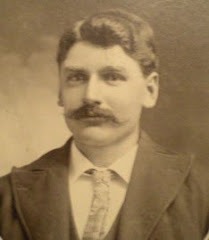


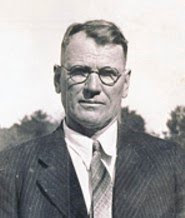

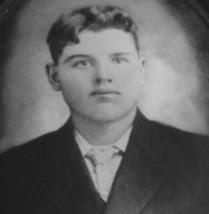

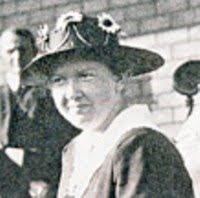
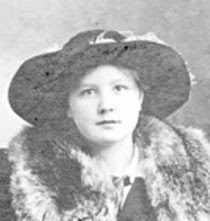
1 comment:
What a wonderful idea to celebrate early settlers. Nice blog.
Post a Comment